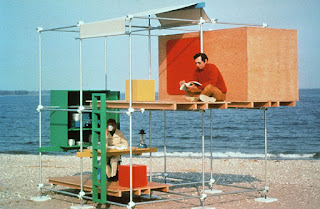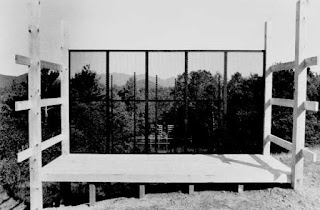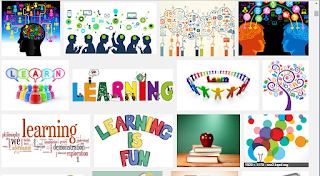Ashes and Embers. Haile Gerima, UCLA Film & Television Archive, still.
The L.A. Rebellion: How the '65 Watts Riots helped spark a cinematic revolution [soundcloud, 5 mins]
The California Report, by Steven Cuevas, 9 August 2015
This weekend marks the first anniversary of the police shooting of Michael Brown in Ferguson, Missouri, an event that sparked anger, unrest and lots of questions about policing in communities of color. Those same issues were at play 50 years ago this month in the Watts neighborhood of Los Angeles. The story is familiar: a young black man pulled over by police for suspected drunk driving, an argument, a shoving match and within hours a full-blown riot. A few years later, a group of young black filmmakers from UCLA would use Watts as the backdrop and inspiration for a short-lived but influential film movement that came to be known as the "L.A. Rebellion." Its story is chronicled in a forthcoming book and expansive DVD collection.
More about the L.A. Rebellion:
It functioned as a cross-disciplinary group, filled with undergraduates and graduates from all departments who wanted to learn filmmaking. They were a collaborative group, crewing on each other’s films, offering critiques on rough cuts, and organized film exhibitions, lectures, and conferences. Composed of Africans and African Americans, they worked to create a film language to respectfully express cultural particularity and Black thought. The L.A. Rebellion sought to compel the audience to intervene in the social reality rather than passively accept it. Bush Mama (1976) and Killer of Sheep (1977) took place in the Watts neighborhood, where people who actually lived there acted in the films. In this way, L.A. Rebellion’s work created images that were very particular. Their community-oriented film praxis serves to refute Hollywood convention, and therefore whiteness’ cultural power from being the unseen universal.
Be Kind, Rewind, dir. Michel Gondry, 2008.
Two bumbling store clerks inadvertently erase the footage from all of the tapes in their video rental store. In order to keep the business running, they re-shoot every film in the store with their own camera, with a budget of zero dollars.
You'll Like This Film Because You're In It: The Be Kind Rewind Protocol, 2008.
Michel Gondry has a utopian vision, and you're a part of it. In short, he sees a future in which communities will come together to create cinema. But here's the thing: it doesn't matter if the finished product is good or bad; it just matters you make it. This is Gondry's manifesto: it lays down the rules so that you and your neighbors can try it for yourself. Don't have a DV camera? Not to worry: you can write to Gondry via his website, and, if he thinks you're serious about following the protocol, he just might lend you one to carry it out.
In a way, he's advocating for the 21st century version of community theater: the process is to be as much fun as the performance, and the performance is to have a finite reach. It is for your friends and neighbors, not for some stranger mindlessly searching for Katy Perry videos on YouTube. To ensure that the protocol is not used as a gateway to Hollywood, Gondry has imposed a time limit on the inception and production of the video. The participants are to execute a series of tasks, each more difficult than the last, which will result in the completion of a short film. To discourage preciousness, Gondry repeatedly insists that "imperfection is your ally"; again, the purpose of the protocol is that you finish it.
Biblioburro is the story of a librarian and a library. A decade ago, Colombian grade-school teacher Luis Soriano was inspired to spend his weekends bringing a modest collection of precious books, via two hard-working donkeys, to the children of Magdalena Province's poor and violence-ridden interior. As Soriano braves armed bands, drug traffickers, snakes and heat, his library on hooves carries an inspirational message about education and a better future for Colombia.
History Moves also engages in cultural partnerships through history making. Our toolkits will impart the skills required to produce and curate public history, with a focus on archival research, oral history, material culture and clear and concise writing. We will also work with area historical institutions such as libraries and archives to expand access to under-displayed historical sources.






































